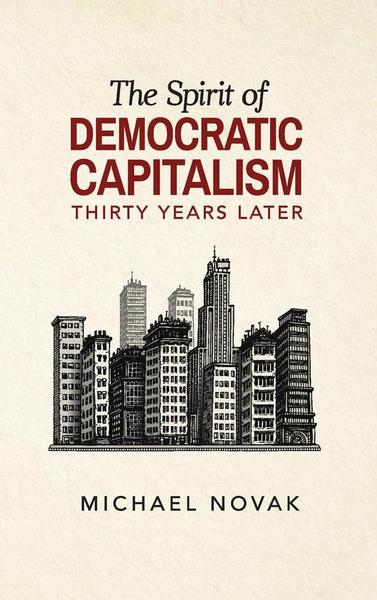Ben Cooper: “The Spirit of Democratic Capitalism” by Michael Novak

Revd Dr Ben Cooper is Minister for Training at Christ Church Fulwood in Sheffield. He holds doctoral degrees in both Theology and Economics. Before training for ordained ministry, he was a post-doctoral research fellow in economic theory at Nuffield College, Oxford. He is married to Catherine and has three children.
Martin Novak is an American Catholic author, philosopher, and theologian. Born in 1933, he tells of how he took seriously Aristotle’s advice that a man cannot write well on ethics until he is at least fifty, and so waited until the late 1970s before starting work on what has become his most influential book, The Spirit of Democratic Capitalism. In the intervening years, he had become increasingly convinced that the actual practice of what he calls “democratic capitalism” is more consistent with the high ideals of Judaism and Christianity than the practice of any other system. This was a radical conclusion to reach. As he notes (page 242), it was generally assumed at the time that prominent thinkers like Paul Tillich were right to say, “Any serious Christian must be a socialist”. The term “capitalism” was used in many Christian circles, as it was by many in the academy, with contempt.
The Spirit of Democratic Capitalism was published in 1982 — just before Novak’s fiftieth year, as it happens, but it is nonetheless ethical writing on political economy of the highest quality. The book is divided into three parts, beginning with an enquiry into “the ideal of democratic capitalism”. The term “democratic capitalism” was not in wide usage at the time, and Novak appropriates it to describe a three-fold dynamic system: “a democratic polity, an economy based on markets and incentives, and a moral-cultural system which is pluralistic and, in the largest sense, liberal” (page 14). Novak challenges the negative stereotypes: “The spirit of democratic capitalism is the spirit of development, risk, experiment, adventure” (page 48). It is pluralistic: power and control is dispersed, countering any tendency to tyranny. It is relatively resilient to errors of unintended consequence. It doesn’t make the mistake of thinking economic decisions constitute a zero-sum game. It’s more conducive to community than you might think, especially in relation to the family. All this, Novak contrasts with socialism in the second part of the book, “The twilight of socialism”. In the light of its practical failures, socialist thinkers have retreated into idealism and claims of moral vision, mostly centred around questions of equality and justice (page 207). Novak critiques these claims both at the level of ideals and, in one of the rare empirical sections of the book, in terms of real outcomes. In the final section, he then attempts “A theology of economics”, critiquing a number of approaches before outlining his own, rather limited, account of the theological doctrines underpinning democratic capitalism.
This is a lengthy book, requiring some perseverance to work through its 460 pages. I found myself on occasion yearning for a more orderly and concise argument. Other times, I felt in need of some more formal analysis or hard evidence. Nonetheless, The Spirit of Democratic Capitalism is essential reading for anyone interested in the ethics of political economy. The basic argument is, on the whole, satisfying and persuasive. Socialism claims, in part, that capitalism institutionalizes greed and selfishness (page 92), and positions itself as an antidote. But socialism cannot do away with greed and selfishness. Rather, these negative impulses survive to inflict enormous damage, because the rigidity of a centralised system means there are relatively few checks and balances to constrain them. Under capitalism, the constraints on the damaging social effects of greed and selfishness turn out to be superior, because success typically depends on doing something that will be of benefit to other people (although, as Novak and others have noted, this requires a democratic polity and strong moral cultural foundations to function well). Moreover, capitalism provides a setting within which some of the more positive aspects of human nature, such as creativity and invention, can flourish. In such a setting, many kinds of failure are actually part of the learning process through which innovations develop and improve, and cause economies to grow. Importantly, in none of this does Novak claim perfection for democratic capitalism. It “does not promise to eliminate sin” (page 85). His claim is a relative one: “all other known systems of political economy are worse” (page 28). It’s in democratic capitalism, he goes on to say, that our best chances lie: “Such hope as we have for alleviating poverty and removing oppressive tyranny — perhaps our last, best hope — lies in this much despised system”.
So successful is Novak’s basic argument that the question now is not so much whether one should be “for” democratic capitalism or “against”; rather, the question becomes what kind of democratic capitalism should we favour and promote? Given that “the democratic capitalist revolution is moral, or not at all” (page 439), Christian thinkers should have plenty to contribute on this question. Novak’s own attempt to do so in the final section of the book is perhaps its weakest and most undeveloped part. There is only the faintest glimpse of how democratic capitalism might fit with the wider plans and purposes of God in history across the nations. On such things Novak was very clear even as he wrote that there is much more to say.
“The Spirit of Democratic Capitalism” was first published in 1982 by Simon & Schuster. This is a review of the revised edition, published in 1991 by Madison Books (ISBN-10: 0819178233), 460pp.
 Revd Dr Ben Cooper is Minister for Training at Christ Church Fulwood in Sheffield. He holds doctoral degrees in both Theology and Economics. Before training for ordained ministry, he was a post-doctoral research fellow in economic theory at Nuffield College, Oxford. He is married to Catherine and has three children.
Revd Dr Ben Cooper is Minister for Training at Christ Church Fulwood in Sheffield. He holds doctoral degrees in both Theology and Economics. Before training for ordained ministry, he was a post-doctoral research fellow in economic theory at Nuffield College, Oxford. He is married to Catherine and has three children.
